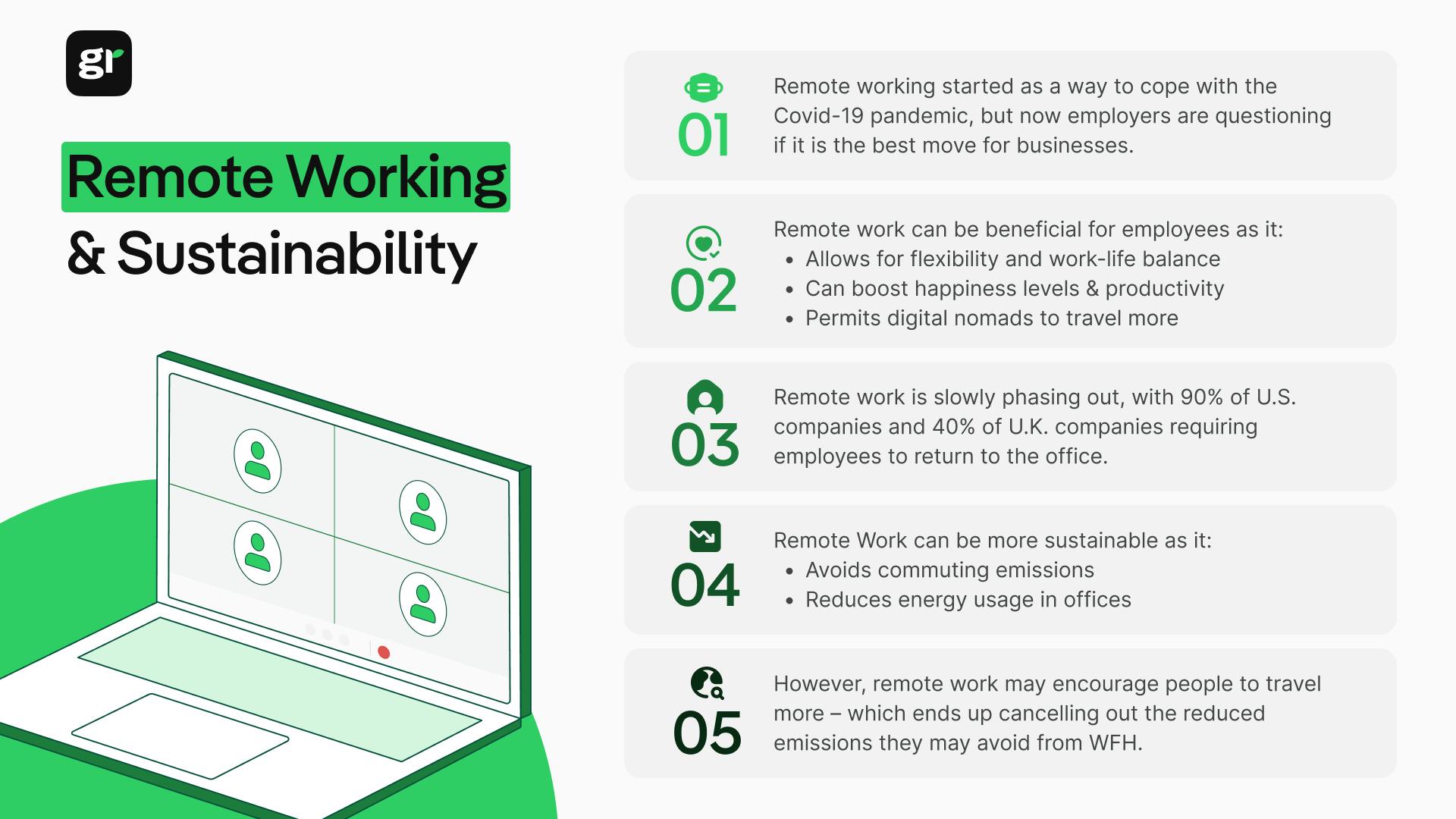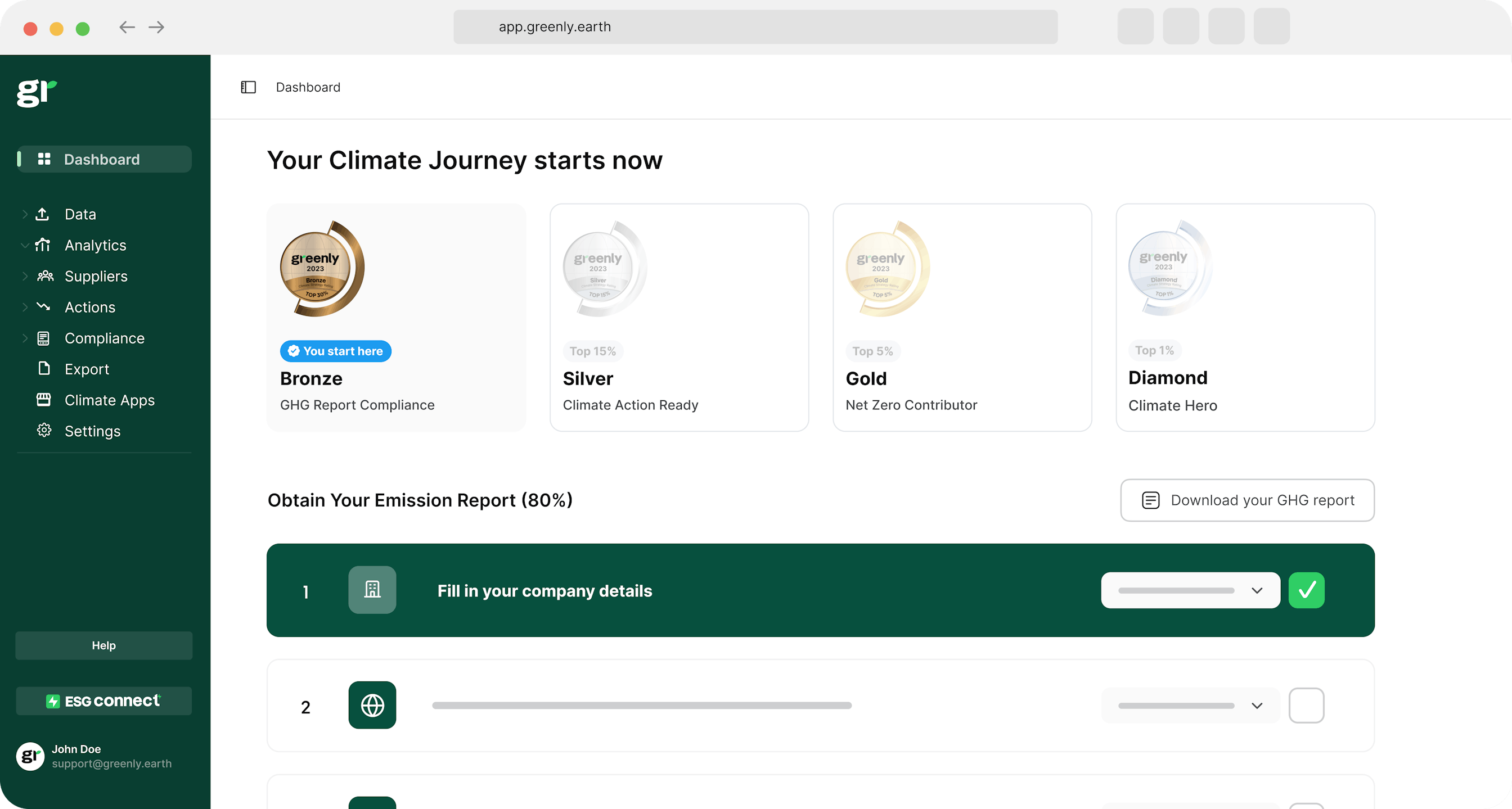ESG / CSR
Industries
Remote Work: Is it as Sustainable as We Think?



The world was already well on its way to transitioning into a daily digitalized society, but the pandemic inevitably accelerated that projected premise. Following the COVID-19 crisis, more people work from home, shop online, conduct medical visits, and have groceries delivered to their home than ever before.
Remote working has become increasingly common as companies and employees alike have praised remote work for its flexibility and sustainability – allowing people to take jobs with virtual teams in remote locations allowing for digital nomadic lifestyles to free travel across Europe, Latin America, or around the world.
But is remote work as good for the environment as we think it is?
👉 In this article, we'll discuss the pros and cons of fully remote work, if remote jobs are more sustainable, and if it is worth searching for a full time remote position if sustainability is your main priority.
What is remote work?
Remote work is a style of working that permits employees to work anywhere regardless of locale – meaning that as long as they have a laptop, stable internet connection, and their brain: there's no need for them to physically report to a traditional office.
Remote workers can complete their tasks with more ease and efficiency than someone required to go to the office might be able to, as there are often no hours to “clock in”, long commutes to make, or in person meetings to sit through.
💡 Remote work allows people to organize their days so that better balance can be established between their professional and personal lives – helping them to complete household or private tasks that normally should've completed hours ago or days ago.
Many enjoy the freedom of remote work, as it provides them with a flexible schedule and organization that wasn't possible prior to the pandemic – where many still went into the office to work to ensure customer success and quality team management.
👉 In fact, the amount of people working from home in the U.S. tripled between 2019 and 2021 as a result of the pandemic. However, as of 2024 – several companies are eschewing the option to work remotely, citing the need to return to the office to boost productivity and ensure employees earn their pay.
Evolution of Remote Work (2020-2024)
| Year | Details |
|---|---|
| 2020 | In May 2020, 48.7 million people, or around 35% of the employed workforce, reported that they had worked from home. The Covid-19 pandemic spurred the notion of remote work and showed that many could effectively work from home. [Source](https://www.census.gov/newsroom/press-releases/2022/people-working-from-home.html) |
| 2021 | Work from home continued and digital nomadic lifestyles began. Some offices started offering hybrid work models. The BLS American Time Use Survey reported that in 2021, 38% of employed persons did some or all of their work at home on days they worked, for an average of 5.6 hours, and 68% did some or all of their work at their workplace, for 7.8 hours on average. This compared to 24% at home and 82% onsite, respectively, in 2019. [Source](https://www.census.gov/newsroom/press-releases/2022/people-working-from-home.html) |
| 2022 | Hybrid models ramped up and fully remote work decreased. [Source](https://eig.org/remote-work-in-2022/) |
| 2023 | Hybrid models encouraged more in-office days. [Source](https://www.cnbc.com/2022/02/18/people-are-working-from-home-out-of-preference-not-just-necessity.html) |
| 2024 | Companies encouraged returning to work in the office full-time, with 90% of U.S. companies citing they'll be back in the office sometime this calendar year. [Source](https://www.cnbc.com/2023/09/11/90percent-of-companies-say-theyll-return-to-the-office-by-the-end-of-2024.html) |

What are the benefits of remote work?


Remote work has a million benefits – such as allowing colleagues to plan meetings on a less stringent schedule, the ability to attend and connect with other countries for virtual meetings, increased availability ad flexibility, and allowing part-time students to receive an education easier in their free moments.
I mean, why wouldn't you want to be able to roll out of bed at nine in the morning, open your laptop up still in your pajamas – and make money while doing it?
💡 Besides the comfortable component that comes with remote work, there are several other benefits to this new, now conventional, style of employment. Working remotely allows one to travel, flexibility in one's schedule, and personalize work-flow to be most productive according to the individual.
Benefits of Remote Working
Flexibility
Personally, as a writer – I can't imagine not having the opportunity to work remotely. Writers need the creative freedom to write when they feel inspired or “in the zone”. If I was required to go into an office, and sit at a desk for eight consecutive hours between the conventional hours of 9AM to 5PM – I wouldn't be nearly as productive as I am working from home.
I can work from my bed (just as I am writing this article about remote work in my pajamas now), take a break to make a proper lunch instead of grabbing something from a vending machine, do a little work-out in my apartment to break up my day, listen to music in between writing paragraphs, or take a nap if I'm too exhausted from the night before. These are all activities that create balance in my work days which ultimately allow me to be more productive, and frankly – would be impossible if I were required to work at the office.
This comfort isn't just in my head, as a study conducted by Forbes concluded that people who work from home are up to 20% happier than those obligated to work from an office.
👉 Therefore, it is important to remember that while many companies across the world are encouraging an end to remote working (especially in the U.S. where only 2% of businesses will require their team leaders and members to work from home) – it may allow employees to focus better on their work tasks, and that a hybrid work model could still prove beneficial to both individuals and large corporations.
Change of Scenery & Mental Health
Remote work also provides the opportunity for the employee to change their scenery when they wish.
Convenience & Improved Work-Life Balance
The flexibility provided with remote work allows employees to plan pivotal appointments at more convenient hours. Long gone are the days when you could only go to the dentist after you left the office, because remote work lets employees manipulate their schedule as they wish.
I know for myself, being an American that lives in France, I had several administrative appointments to attend that would have been difficult to arrange outside of working hours. If I didn't work remotely, obtaining my residence card and health insurance would have been much more difficult – which demonstrates how remote work ultimately reduces stressful events by creating more time to take care of personal matters.
When I went to college, I didn't live on campus – and drove an hour every day to get to class. Daily commuting used to be common for employees, especially in the United States. Now, without my daily commute – I have nearly five hours a week of my life back.
👉 Remote work has granted many employees with the most indispensable and relevant resource of all: time to allow for proper maintenance in their personal lives, which can help to support their professional development.
Start-Up Opportunities
Remote work isn't only beneficial for employees, but it's a big plus for employers, too. As remote work grows in popularity, employers are no longer restricted to hire people based on locale. This means an employer has the opportunity to hire someone with exceptional skills best for the job, even if it means they don't live near the physical office or have access in to in-person meetings.
💡 In addition to this, this means that remote work can allow small start-ups to grow with more ease and simplify the recruitment process – which help to address sales concerns, maintain business growth, and recruit the best possible talent even if the company is on site in New York but the employee lives in California.

Do people prefer remote work over going into the office?
Many people, myself included, prefer remote work over going into the office as it allows them to freely organize their day as they wish and improves their productivity. However, this isn't the case for everyone – as some professions are difficult to be productive or successful without going into the office.
Remote work has also made many feel they lack a connection with their co-workers – up to 60% feel remote work is the cause of this.
💡 However, studies still reveal that people ultimately prefer remote work over going into the office – with almost 80% of people voting that they prefer to continue remote work even if their company has re-opened their office spaces

What are the cons of remote work in terms of sustainability?
It could appear on the surface that with remote work replacing millions of once daily commuters polluting the atmosphere, that emissions would be drastically reduced. However, that isn't the case, as emissions have returned to the same levels as they were prior to the pandemic – even as most employees have continued to work from home.
Aspects to consider for the carbon footprint of remote working
Many aspects were once easier to regulate in the office, such as the use of electricity and increased use of devices for working from home, travel for those taking on the newly available life of a digital nomad, or even the recycling bins available in the office that many don't have at home. All of these little, but imperative, actions towards implementing sustainability ultimately become the responsibility of the remote employee – which can make promoting and accomplishing sustainability difficult.
Travel
Increased travel and digital use can increase the use of electricity and energy that otherwise wouldn't occur in person is contributing to emissions just as much as they were when people were still required to work at the office.
While it is clear that less commuting has an inevitable, positive impact on greenhouse gas emissions and the environment – the flip side of the coin shouldn't be ignored. Meaning, people don't have to spend their time commuting anymore, and they have more time, money, and energy to allocate those resources towards other activities that are just as carbon emitting as commuting.
💡 In fact, work-from-home sparked a 26% increase in the amount of personal trips taken.
Many predicted the post-pandemic era as a reborn version of the roaring twenties. After months of restrictions, people around the world are rebelling and making up for lost time by traveling, socializing, and attending more concerts than before – which are all high carbon emitting activities.
Increase in Electricity Usage
Less time at the office also means more communication via the internet is required, which again – means more energy usage that negatively impacts the environment. Remote work has shown potential in reducing emissions, but it also suffers multiple potential setbacks that the employer can't control.
Office Buildings
When employees work from home, it means that offices don't need to ramp up the heating or air conditioning, lights, computers, and other energy-sucking devices for hours on end. This can help companies cut back on limited resources, reduce their scope emissions, and work towards their climate goals. As a result, individuals may find that their personal utility bills are higher as a result from working from home.
👉 Remote work can prove more sustainable, but only if the individual employee makes it a priority for climate change to matter to them and if they decide to adjust their work habits and personal excursions accordingly.
What is the best solution for sustainability and reducing emissions when it comes to remote work?
Since sustainability will be more contingent on the remote worker than the company itself, it is up to the company to encourage employees to recognize the importance of sustainability on their own – meaning that the best option for sustainability is likely to be contingent on a a company's intended goals, available tools to ensure productivity, and overall principles.
Encourage work-from-home employees to go green
For example, if a company allows everyone to work from home – they are more than likely going to use their own personal computers. While this is convenient for the employee, the employer has no idea how much energy the machine the employee uses or the carbon footprint that was made to manufacture the computer in the first place.
💡 A solution to this problem would be to provide all employees with a laptop from a company that produces energy efficient laptops suitable for remote work. This way, the company can ensure that everyone is using the same amount of energy as they would be if they were working from the office.
Offer relevant services & resources to encourage sustainable "WFH" habits
Employers should encourage employees to switch to renewable energy sources at home wherever possible. This can include providing employees with green travel when meeting in person is necessary, such as bike services or a monthly public transportation pass.
Also, offering to help employees recycle or properly dispose of previous electronic devices can help. It's the same concept with recycling in general. Everyone wants to recycle, but if there's no recycling bin anywhere in sight – no one is going to go through the extra time or effort to find one. They're just going to throw away what could be recycled.
👉 It's like the infamous phrase, “the teacher can show you the door, but the student has to walk through it.” It's up to the employer to show the employee the doors to sustainability.

So which is better: remote work or going back to the office?
The environmental benefits of remote work are still clear: less commuting means reduced greenhouse gas emissions, mitigating the use of paper and plastic in the office, and preventing the need for deforestation to feed the insatiable needs of urbanization as previous offices spaces can serve as housing that otherwise would not have been available.
That isn't to say that remote work is a one-size-fits-all solution, as it clearly has its downsides when it comes to sustainability just as much as working in the office does.
What About Greenly?
If reading this article on how sustainable remote work is has made you interested in reducing your carbon emission to further fight against climate change – Greenly can help you!
At Greenly we can help you to assess your company’s carbon footprint, and then give you the tools you need to cut down on emissions. We offer a free demo for you to better understand our platform and all that it has to offer – including assistance with boosting supplier engagement, personalized assistance, and new ways to involve your employees.
Click here to learn more about Greenly and how we can help you reduce your carbon footprint.




